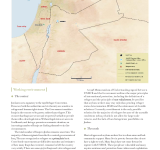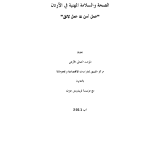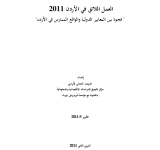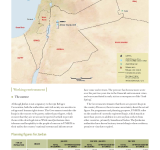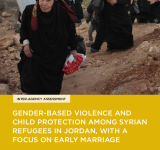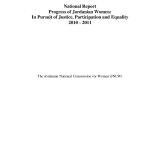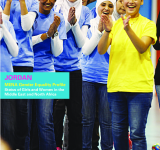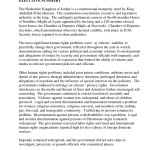participation
يهدف هذا التقرير إلى تقديم قراءة تقييمية لواقع الصحة والسلامة المهنية في بيئة الأعمال الأردنية;; تتضمن قراءة في التشريعات الأردنية الخاصة بالصحة والسلامة المهنية;; إلى جانب استعراض لأبرز المعايير الدولية ذات العلاقة;; إضافة إلى تقديم قراءة لمدى موائمة التشريعات الأردنية مع المعايير الدولية في هذا المجال;; كما اعتمد التقرير في منهجيته على تحليل البيانات الاحصائية المتاحة حول الصحة والسلامة المهنية واصابات العمل;; وكما تم اجراء مقابلات مع بعض رؤساء النقابات العمالية;; وذلك إلى جانب مراجعة المعلومات والأخبار الصحية التي تناولت هذا الموضوع. ويقدم التقرير مجموعة من التوصيات التي من شأنها تحسين شروط الصحة والسلامة المهنية للعاملين في الأردن.
إن هذا التقرير يحليل واقع تطبيق معايير العمل اللائق في الأردن على مستويين;; يتمثل المستوى الاول في فحص التشريعات العمالية الأردنية المتمثلة في قانون العمل الاردني وقانون الضمان الاجتماعي وغيرها من الانظمة والتعليمات والقرارت ذات العلاقة بالعمل. أما المستوى الثاني من التحليل فيتمثل في فحص واقع التطبيق الفعلي لمعايير العمل اللائق سواء كانت واردة في التشريعات الاردنية ذات العلاقة أم لا. كما قدم التقرير مجموعة من التوصيات لتحسين واقع العمل الممارس في الاردن .
This 4 page fact sheet provides information about Iraqis in Jordan including UNHCR's reponse to them in 2012.
The report aims to address the particular needs and cultural dynamics of Syrian refugees residing in Jordan;; especially with regards gender-based violence and child protection issues. It presents a comprehensive range of perspectives from urban Syrian refugees and local Jordanian decision makers in government;; community-based organizations and the religious and education sectors. The assessment of this report is based on data collected through three methodologies including questionnaire survey to refugees outside the Za’atari refugee camp;; focus group discussions in regions across Jordan and in-depth interviews. Key findings of the report are 1. The rates of early marriage are high;; 2. A significant percentage of children contribute to the household’s income and 3. Restrictions on women and girls’ mobility constrain their participation in social and economic activities and access to basic services. The report recommends measures to prevent acts of sexual exploitation and abuse and ensure the needs of the most vulnerable members of the Syrian refugee population in the cities.
This national report is designed to trace the progress of women in various fields;; monitoring achievements;; and highlighting gaps and failures;; as well as analyzing indicators;; recommending measures;; and measuring levels of achievements in the implementation of plans and strategies. The main themes were selected according to national priorities dictated by each stage: Legal Protection for Women's Right to Access Justice;; Participation;; the Economic Empowerment of Jordanian Women;; Equality;; Citizenship and Decision-Making in Public Life. The conclusions of this report confirm that a much smaller effort was exerted at the level of providing information;; data and the provision of services in the area of providing justice and facilitating ways of achieving it. The lack of knowledge about available services among women;; whether provided by civil society organizations or government institutions;; affects women's ability to access justice negatively. Regarding the economic participation the Policies and plans that targeted empowering women economically show that the result of these policies was weak and limited. Difficulty of women’s access to job opportunities in the private sector and inequitable pay between the sexes;; lack of supporting services to working women;; including childcare Facilities;; poor matching between education outputs and skills required in the labor market and the traditional social standards that contribute to directing females towards certain professions. The report proposed general recommendations and directions that include quick solutions to deal with the main highlighted challenges.
This report is designed to trace the status of girls and women in Jordan. The main themes are: civic rights;; legal rights;; women political participation;; education;; participation in the labour market;; health;; reproductive health;; child protection;; domestic violence;; HIV/AIDS and treaties.
يهدف التقرير إلى عرض أهم مشاكل حقوق الإنسان في الأردن;; والتي كان ابرزها: سوء المعاملة ومزاعم التعذيب من قبل مسؤولي الأمن والحكومة مع الإفلات من العقاب;; والقيود المفروضة على حرية التعبير التي تحد من قدرة المواطنين ووسائل الإعلام في انتقاد السياسات والمسؤولين الحكوميين;; وشملت أيضاً ظروف السجن السيئة والاعتقال التعسفي والحرمان من المحاكمة العادلة من خلال الاعتقال الإداري;; والاحتجاز لفترات طويلة;; ومزاعم من المحسوبية ونفوذ المصالح الخاصة على القضاء. واستمرت الحكومة في التعدي على حقوق الخصوصية للمواطنين. وكان العنف ضد المرأة منتشراً على نطاق واسع;; واستمرار الاعتداء على الأطفال. والى جانب انه لا يزال التمييز القانوني والمجتمعي والمضايقات تمثل مشكلة بالنسبة للمرأة. وكان التمييز ضد الأشخاص ذوي الإعاقة مشكلة. وظل التمييز القانوني والمجتمعي ضد الأشخاص من أصل فلسطيني واسع النطاق. وذكر التقرير أن الحكومة قيدت حقوق العمال ومنظمات حقوق الإنسان المحلية والدولية على مستويات عالية من إساءة معاملة خدم المنازل الأجانب. ولقد كانت المواضيع الرئيسية في هذا التقرير هي: الحق في العمل;; الحق في الخصوصية والحق في التعليم;; والتمييز العنصري;; والتمييز ضد المرأة;; والحق في حرية التنقل;; والحق في حرية التعبير;; والحق في حرية تكوين الجمعيات;; والحق في حرية الدين ;; والعنف;; وعمالة الأطفال;; الحق في محاكمة عادلة;; الحق في المشاركة;; الحق في الضمان الاجتماعي.
